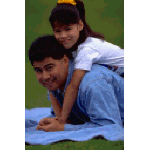THE ROAD™
Counselling & Personal Development
"....one of the most innovative and effective counselling services
available
and a wealth of resources for your own reading and personal development...."
Caregivers' Skills Program
HELPING THE IA OR HM CHILD TO FEEL BETTER
 In this section we'll discuss additional
ways to improve a child's self-worth. Typically, getting a child under control
with the Caregivers' Skills Program produces dramatic behavioural improvements;
adults and peers then treat them more positively, which is crucial for
positive self-esteem. However, parents can do some extra things to help IA or
HM children feel even better and ensure that they won't ever need Ritalin
again.
In this section we'll discuss additional
ways to improve a child's self-worth. Typically, getting a child under control
with the Caregivers' Skills Program produces dramatic behavioural improvements;
adults and peers then treat them more positively, which is crucial for
positive self-esteem. However, parents can do some extra things to help IA or
HM children feel even better and ensure that they won't ever need Ritalin
again.
Removing over-stimulation and having quiet time helps children feel more calm and at peace. Calming nervousness helps reduce the typical behavioural and cognitive problems. We'll review some suggestions for helping make this happen.
IMPROVING SELF-ESTEEM
How children feel about themselves is more crucial to their healthy development than any other factor. Their self-feelings are determined by thoughts, beliefs, and attitudes, as well as their deepest beliefs about themselves, which we call self-image or self-esteem.
Psychologist Eric Berne called this positive self-image "I'm OK." This chapter will explore the negative thought patterns and feelings -"I'm Not OK" - that are typical of IA or HM children and discuss how to change them.
A poor self-image almost guarantees a life of repeated failures and an ever-deepening loss of self-worth. This vicious cycle gets reinforced from almost every direction. Let's review how this occurs.
IA and HM children suffer from low self-esteem for three basic reasons:
1. They are impulsive and obnoxious in many ways, so they are often the butt of teasing and ridicule from other children. If their temper flares up as a reaction to this treatment, the ridicule worsens.
2. Parents and teachers sometimes call IA or HM children stupid and lazy. Fortunately, most teachers and parents try to avoid such cruelty. Keep in mind, however, that subtle looks of anger, disappointment, and scorn have a powerful effect on a child. Adults may not mean to do this; facial expressions and body language are natural reactions that are hard to mask but are devastating to the emotional development of these children.
3. The IA or HM child's self-deprecating, poor-me and negative statements are verbal habits that can become internalized and eventually become their true feelings and beliefs. When IA or HM children get their way or win attention or pity for these verbalizations, the adult reinforces them-however unintentionally. Each incident of reinforcement strengthens the verbal pattern into a habit. With Constant repetition, youngsters lose the ability to discriminate between when they are feeling bad and when they are manipulating, so over time they increasingly do feel bad most of the time. Eventually, these boys and girls begin to believe in what they have been repeating for years - that they are rotten and so is the world. In psychological terms this is called internalizing. By the age of ten this internalizing can be complete. This is not a very healthy belief pattern.
PREVENTION - THE KEY TO SUCCESS
 If parents have a hasty, impulsive
child, then early intervention is crucial for creating and stabilizing a
healthy self-image. Rigorously apply the CSP. Offer praise for even small
successes. Break down complex behaviours into steps that the child can conquer,
and then praise her for successfully taking these small steps. Give your son
or daughter household responsibilities such as helping with food preparation,
even if it's just pouring a can of "stuff" into a pot. Help your
child feel important, confident, and independent. Show your pleasure and offer
praise for her help; both mean a lot. Make positive statements about a child
from an adjoining room, deliberately within earshot, so she can
"overhear" the praise.
If parents have a hasty, impulsive
child, then early intervention is crucial for creating and stabilizing a
healthy self-image. Rigorously apply the CSP. Offer praise for even small
successes. Break down complex behaviours into steps that the child can conquer,
and then praise her for successfully taking these small steps. Give your son
or daughter household responsibilities such as helping with food preparation,
even if it's just pouring a can of "stuff" into a pot. Help your
child feel important, confident, and independent. Show your pleasure and offer
praise for her help; both mean a lot. Make positive statements about a child
from an adjoining room, deliberately within earshot, so she can
"overhear" the praise.
If your child makes negative statements only occasionally, let her sit on your lap and discuss her feelings. Only do this if the target behaviours of poor-mes and negativity have already been completely stopped. Then it's OK to hug, comfort, and reassure a child when she is not feeling good about herself. Tell her the many things she does well and ask her to think about these positive things.
When a poor-me or a negative verbalization is rare, your offer of comfort helps a child develop a positive self-image. Just be careful that a negative verbal pattern or habit does not redevelop. When your child makes positive statements about herself, heap on the praise and the hugs.
Use the techniques outlined in this book to increase positive verbalizations, diligence in schoolwork, and responsible behaviours at home. Reinforce your kids for their successes. If you take these preventive measures, I doubt your child will ever be diagnosed as IA or HM and be placed on Ritalin.
In addition, help your children become task and emotionally independent, not tough and strong. The terms tough and strong mean denying feelings or not expressing honest feelings. Independence means believing one can take care of oneself but still have feelings. One can be caring and sensitive and simultaneously independent. Our goal is to help our offspring develop initiative and self-confidence. Don't do everything for them; teach them to do for themselves. The more independent IA or HM children are, the more self-confident they will feel.
If your child has already been diagnosed as IA or HM, the downward spiral is probably already advanced. You must stop it immediately and completely. By this time, when children say negative things about themselves or others, they no longer know whether they mean it or are manipulating. They can't discriminate truth from manipulation.
The negative patterns must be broken by age ten. Getting all target behaviours under control, both at home and at school, is critical. You know how to do this through reinforcers and time out.
Expressing Their True Feelings
But what about IA and HM children being able to talk openly about their feelings? Parents, teachers, and psychologists may say that this program leaves no room for them to express themselves openly. Wrong! We do want them to learn to express their feelings, but we want these children to reestablish the validity and meaningfulness of what they feel. After three or four months of suppressing the poor-mes and the negative verbalizations, you can begin to let them express their feelings.
At their first session, Jane's parents described their eight-year-old as a very emotional child. She'd cry easily if something didn't go her way. As an IA child, she was usually very quiet. If her parents or teachers tried to get her to pay attention to her schoolwork, she'd cry, She'd constantly repeat that no one loved her or that she couldn't do anything right. The poor-mes were a very important target behaviour to get under control. With years of repetition Jane was beginning to feel sorry for herself and see herself as a "not OK" person, i.e., she began internalizing that feeling. Under the CSP, these verbal patterns were completely stopped for four months. After that she was allowed an occasional poor-me and would be comforted by her parents. She was able to reestablish her ability to discriminate between occasional periods of not feeling good about herself and seeing herself entirely as a worthless person. During those months her world changed. She began to succeed: Peers and teachers treated her better.
At times, like all of us, children get down on themselves or they don't feel well or they feel stressed out. After three or four months, we can return to putting them on our lap and discussing their feelings because now they can discern when their feelings are valid rather than manipulative.
THE MOST IMPORTANT THINKING PATTERN OF IA AND HM CHILDREN
 The thinking or cognitive pattern of
attention deficit children is central to understanding their functioning. The
most fundamental cognitive or thinking pattern of these children is that they
do not think. Behavioural approaches that endorse lots of coaching, coaxing,
and prompting not only reinforce cognitive dependency but also send this
message to the IA or HM child: you are incompetent, you can't think for
yourself, you have a disease, and you'll need help and Ritalin for the rest of
your life! Kendall and Braswell (1985) point Out that IA and HM children act
or react mostly emotionally instead of thinking. They don't stop to think
about what behaviour they are doing at the moment and how it is affecting
others around them. In addition, they don't stop to think or cognitively
process the consequences of their behaviour.
The thinking or cognitive pattern of
attention deficit children is central to understanding their functioning. The
most fundamental cognitive or thinking pattern of these children is that they
do not think. Behavioural approaches that endorse lots of coaching, coaxing,
and prompting not only reinforce cognitive dependency but also send this
message to the IA or HM child: you are incompetent, you can't think for
yourself, you have a disease, and you'll need help and Ritalin for the rest of
your life! Kendall and Braswell (1985) point Out that IA and HM children act
or react mostly emotionally instead of thinking. They don't stop to think
about what behaviour they are doing at the moment and how it is affecting
others around them. In addition, they don't stop to think or cognitively
process the consequences of their behaviour.
This cognitive style was broached when we reviewed the three components of the target behaviour of paying attention: looking, listening, and remembering. The failure to remember is the same as not thinking. It is crucial to understand, as I just pointed out, that the traditional way parents and teachers deal with this problem is to both inadvertently reinforce the "not thinking" and to enhance the child's belief that he can't function on his own and will always need help. In addition, failing to remember and not thinking are also closely related to the target behaviour of task and cognitive dependency. This means that as long as everyone around the child is doing all the thinking for the child, he will not think.
Consider this analogy. If a man is blind or hearing-impaired, is it good to do everything for him? When you do so, things get done faster. However, the crucial point is that the man will eventually have to be able to function on his own. Conceptualize the failure to think as a problem the IA or HM child must and can overcome if he is to survive independently. Teach him that he can and must function on his own.
Make IA or HM children think? Break their pattern by carrying out the contingencies of the CSP. Reinforce your kids when they remember what to do, and put them in time out when they don't remember what to do.
Motivating the IA or HM child is of crucial importance.
THE IMPORTANCE OF QUIET TIME
The Bible mentions peace and serenity thousands of times, but modern children enjoy little of this. Children have become addicted to over-stimulation. They watch TV from five to seven hours a day, and most of it is junk, leading to poor values. They'll play video games for hours. We over-schedule them into organized activities. They hardly ever seem to play outside anymore. After one minute of quiet they'll complain, "I'm bored!" However, quiet time is important for IA and HM kids to calm down and find peace within themselves.
There are several ways to break their frenetic cycle:
1. Allow no more than one hour of junk TV, such as cartoons, a day. Completely block out stations with violent or sexual content.
2. Devote one hour every evening to family reading time. Let your children cuddle with you during this time.
3. Set aside fifteen minutes before bedtime to talk quietly. Don't use this time to lecture. In fact, be the listener.
4. Take them for a quiet walk at least once a week. Hold hands. Joke. Be playful. Teach your children the beauty and quiet of God's world.
5. Reduce organized activities, sports lessons, music lessons, and so on, to only one each season / semester / term, being certain it is not one that is over-scheduled with too many practices a week.
6. Kick your children out of the house after school for an hour or two for unsupervised free play.
7. Occasionally take your son or daughter to a park, a stream, or anywhere serene and teach them how to sit quietly and reflect. You need the quiet in your life, too. Stop the frenetic pace for your own sake as well as your child's - and do it now!
Getting IA or HM children's behaviour under control helps them to win reinforcement from those around them and thus feel better about themselves. Helping them eliminate confusion between manipulative statements and true feelings avoids their developing a global and inaccurate belief about being a "not OK" person. Reassuring them and loving them gives them a strong sense of self-worth. Learning to be alone by themselves and enjoy quiet time has a tremendously calming effect on their frenetic style of behaviour. Put all these things together and they won't need Ritalin.
CAREGIVERS'
SKILLS PROGRAM
01 INTRODUCTION
07 PUNISHMENT
12 HELPING THE IA OR HM CHILD
TO FEEL BETTER
13 TEN WAYS TO STOP CREATING
AN ATTENTION DISORDERED CHILD